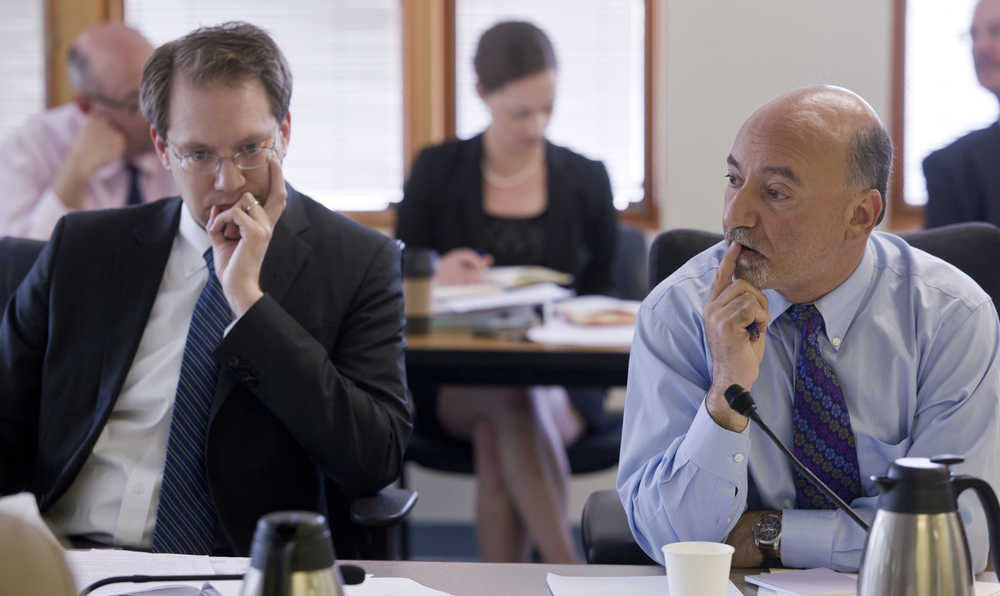Members of the Alaska House Finance Committee continue to express uncertainty and hostility toward a measure that would use money from the earnings of the Alaska Permanent Fund to fund state services.
The committee held a hearing Tuesday morning to consider Senate Bill 128, which promises to roughly halve Alaska’s multibillion-dollar annual deficit by drawing 5.25 percent of the Alaska Permanent Fund annually.
Under current values of the Permanent Fund, that would mean $1.92 billion from the Permanent Fund’s earnings reserve would go to state government.
As a side effect, the bill would halve the annual Alaska Permanent Fund Dividend.
“I think everybody in this building can count votes,” said Rep. Les Gara, D-Anchorage. “Everybody knows the votes are not there for this bill as written.”
Gara later clarified that he might vote for the bill if it was amended.
SB 128 passed the Senate earlier this month, but in order to become law it must be approved by the House Finance Committee, then survive a vote of the full House. Gov. Bill Walker has indicated he will sign the bill if it reaches his desk in its present form.
Speaking Monday on KINY-AM’s Action Line, Rep. Cathy Muñoz, R-Juneau, said she believed the bill had five of the six votes needed to advance from the finance committee.
After Tuesday morning’s hearing, however, she isn’t so sure.
Lawmakers have received a tidal wave of emails, calls and other contacts from constituents concerned about the bill’s effect on the Dividend, and the effect of those contacts was apparent.
“From what I can perceive, the public isn’t fully accepting it,” said Rep. Bryce Edgmon, D-Dillingham, who explained that he’s received a “visceral” response to the bill. “It seems to me that we don’t have the consent of the public.”
SB 128 calls for a $1,000 dividend over the next three years, effectively saving $700 million per year. Without the bill, the dividend is expected to be about $2,000.
“We are deciding who to give this $700 million to: Do we give it to the public, or do we give it to those who are associated with the government?” said Rep. Lance Pruitt, R-Anchorage, in a rhetorical argument.
Revenue Commissioner Randall Hoffbeck told lawmakers that he understands what they’re hearing, but he’s asking for their support anyway.
“As far as the political winds, I think your statements are correct. I think there is a lot of political headwinds out there,” he said, but “What option do we have? If we don’t face those headwinds now, what options do we have?”
In Tuesday’s hearing, Hoffbeck said unless the Legislature makes a significant change this year or in next year’s budgeting process, the state will exhaust the remains of its Constitutional Budget Reserve. It will then begin to spend from the Permanent Fund earnings reserve, the same account that pays dividends.
“In another two years, (that) would be exhausted. At that time, the projection is Permanent Fund Dividends would go away. That’s in about 2023,” said David Teal, director of the Legislative Finance Division, which assists the Legislature on financial matters.
Under SB 128, “Dividends drop to $1,000 now and would continue to be paid for the foreseeable future,” Teal said.
The bill would not close the state’s deficit entirely, but it would stretch the state’s remaining savings and allow the Legislature time to make further cuts, raise taxes or allow oil prices to rise.
Several legislators asked what might happen if the House simply punted and didn’t vote on the bill.
“I would expect that we might visit again,” Hoffbeck said, implying that Walker would call legislators into another special session.
Rep. Steve Thompson, R-Fairbanks and co-chairman of the finance committee, responded, “Calling us back isn’t going to change our constituents’ attitudes or the way we’re going to vote.”
If the implication of another special session was a stick, Hoffbeck also offered lawmakers a carrot, saying the administration is flexible on the amount of the dividend in the coming year, and in the timing of that special session.
The session could even be a lame-duck one, held after the November general election, he implied, but there would be consequences.
“The dynamics don’t change between now and November, except the (budget) consequences get worse,” he said.
• Contact reporter James Brooks at james.k.brooks@juneauempire.com.

